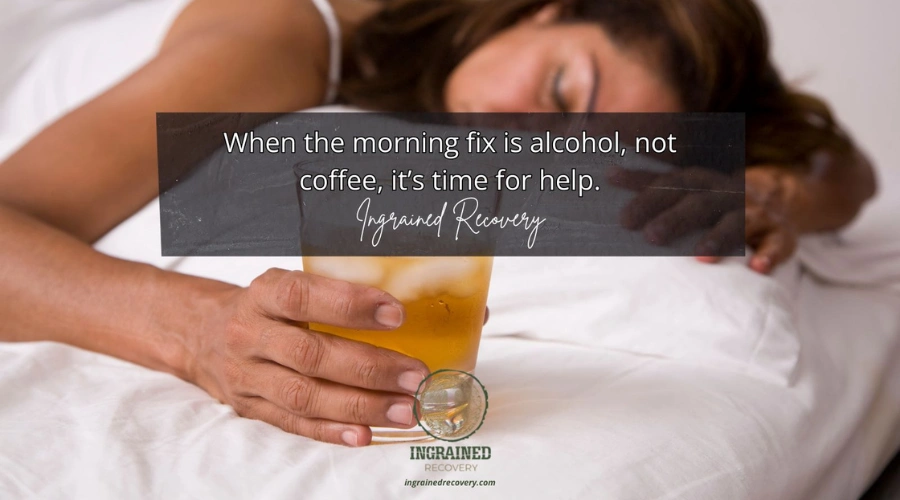The Connotations and Risks of Drinking Alcohol in the Morning
Drinking in the morning before work is a red flag revealing something more complicated than just a bad habit. For some people, morning drinking is a pick-me-up to face the day. But when you need a drink to face your morning emails, it often indicates an underlying alcohol use disorder (AUD).
Often, morning drinking serves as an inappropriate coping tool. In reality, a morning drinking habit is actually a warning that someone needs a professional medical evaluation.
But getting help for drinking habits in the morning does not have to be a chore.
At Ingrained Recovery, we provide treatment for alcohol use on a private, 50-acre recovery ranch. We can help you address the alcohol use disorder and any underlying mental health conditions in complete privacy. We’ll provide help for morning drinking using evidence-based, holistic therapies to support long-term sobriety.
We encourage you to continue reading to learn how drinking alcohol at unusual hours can indicate the need for help and support.
Get Effective Detox and Rehab Options
Find Help At Ingrained Recovery
How Does Drinking Alcohol in the Morning Affect the Body?
Drinking alcohol in the morning is a strong indicator of alcohol dependence. Drinking alcohol excessively interferes with normal sleep-wake cycles, leaving the entire body fatigued.
When someone needs alcohol in the morning to face workplace anxiety or stress, their body’s ability to maintain normal cycles and essential processes has already begun to break down. Here are several ways alcohol affects the body:
- Drinking typically develops gradually as alcohol dependency. It starts with occasional use and escalates until the body eventually needs more alcohol to achieve the same effect. This can include drinking in the morning prior to work or even drinking during the workday to avoid withdrawal.
- The disruption extends to hormone production, immune system function, and the liver (tasked with processing alcohol). This strain on the body makes it harder to function throughout the day.
- Constantly processing alcohol at unusual hours places a strain on metabolism and recovery, causing you to feel fatigued and disoriented throughout the day.
- In the brain, cognitive abilities become impaired. You struggle with concentration, memory, and making decisions.
Alcohol use disorder manifests in numerous ways and impacts each person uniquely. If you’re drinking in the morning and have additional behavioral and physical signs of AUD, it is time to ask for help.
If you’re ready right now, don’t hesitate to contact Ingrained to speak with us confidentially.
Defining an Alcohol Use Disorder in Plain Language

AUD is the medical term for unhealthy alcohol consumption that disrupts daily life. It goes further than casual or social drinking and becomes compulsive. Every substance use disorder interferes with normal daily function, including drinking alcohol.
But it’s important to know that despite the over-the-top behaviors, AUD is a diagnosable medical condition; addiction specialty doctors can treat this disease and help you get better.
What are the Most Common Signs of Alcohol Dependence?
Drinking alcohol in the morning is just one of many signs of an AUD. Knowing the key symptoms can help you understand the scope of the problem.
The Typical Mental and Behavioral Symptoms of AUD:
- Extension of nighttime drinking into the early morning hours
- Increasing alcohol related expenses increase as use grows
- Strain on family suffers and personal relationships
- Declining school or work performance
- Risk of job loss due to alcohol dependence
- Depression, anxiety, or PTSD made worse by alcohol use
- Memory lapses or blackouts after drinking in the morning before work
And the Typical Physical Signs of AUD:
- Development of frequent and physical tolerance, needing more alcohol for the same effect
- Shakiness, sweating, or nausea without alcohol
- Noticeable weight changes or loss of appetite
- Sleep loss
- Redness in the skin, especially around the nose
- Bloodshot eyes
- Blood pressure changes
In addition to these symptoms of alcohol use, alcohol affects many facets of daily life. For example, work performance typically suffers, and personal relationships become strained when drinking alcohol excessively.
The Hidden Consequences of Alcohol Use at Work and Home

Morning drinking typically develops as a disordered coping tool. People think they can control their drinking despite evidence otherwise. Drinking alcohol in the morning can lead to mistakes, workplace accidents, and failing drug tests. It can lead to disciplinary actions and job loss.
At home, alcohol use disorder interferes with the family’s routines. Your partners, parents, and children begin to lose trust and may begin to pull away as a defense mechanism, leading to further isolation and even more time spent drinking alcohol alone.
Get Accredited Treatment at Ingrained
Find Help At Ingrained Recovery
When Drinking in the Morning Becomes an Alcohol Addiction
Morning alcohol consumption significantly disrupts the body’s natural rhythms and functions. It may start as a way to calm your nerves and face the day, but over time, it becomes a compulsion.
If you get withdrawal symptoms when alcohol isn’t part of your morning routine, it is nearly impossible to stay focused during the day. It is time to seek professional help.
Our Evidence-Based Alcohol Treatment Therapies

Ingrained Recovery uses a variety of personalized, evidence-based treatment methods to help our clients overcome their addictions. Here are a few likely therapies we use for clients who struggle with alcohol:
Medical Detox to Manage Withdrawal Symptoms
Morning often accompanies withdrawal symptoms, including tremors or nausea. In a medically supervised detox program, professionals monitor clients for several hours or days to ensure comfort and safety. The process reduces the risk of relapse and prepares the body for therapy.
Medication-assisted Treatment (MAT)
Medication-assisted therapy provides FDA-approved medications to ease withdrawal symptoms and lessen cravings for alcohol. When paired with counseling, MAT is effective in making headway toward long-term recovery.
Cognitive Behavioral Therapy (CBT) and Dialectical Behavioral Therapy (DBT)
CBT teaches clients to reframe negative thoughts that trigger drinking, and DBT helps develop emotional regulation.
Both are effective in individual or group therapy and help clients learn appropriate coping skills to avoid relapse and enjoy healthier lives.
Why Privacy and a Supportive Environment Matter in Recovery
Ingrained Recovery provides our clients with alcohol use disorder recovery services in a private, inpatient setting at our location in Eastman, Georgia. People seeking recovery from morning drinking may find privacy as important as the therapy itself, especially public figures or well-known career professionals.
Our private setting allows every client to focus on healing without worrying about outside influences. You’ll enjoy wide, open spaces, equine therapy, and a discreet setting.
If you require outpatient treatment, we provide referrals to intensive outpatient programs (IOPs) and partial hospitalization programs (PHPs) to our highly qualified care partners throughout the Peach State.
How Loved Ones Can Encourage Recovery Without Enabling

If you are a family member or friend, you probably wonder how you can encourage recovery. Supporting your loved one doesn’t mean ignoring their drinking problem or covering their mistakes. It means asking them to get treatment and setting healthy boundaries to protect both parties.
Caring without enabling takes a delicate balance. Take care of yourself, and please consider attending an AlAnon support group, especially if those personal relationships become strained because of your loved one’s heavy drinking.
Up To 100% of Rehab Covered By Insurance
Find Help At Ingrained Recovery
Call Today for Supportive Programs at Ingrained Recovery
Drinking in the morning before work is a critical sign of the need for support. If you or a loved one needs help, our team is ready to provide the necessary support, including counseling, equine therapy, and structured daily routines to support lasting, successful sobriety.
Our holistic approach considers not only healing the issues with alcohol but also restoring overall physical and mental wellness to each client.
We’re here 24/7 to help you get well again – call us today.

